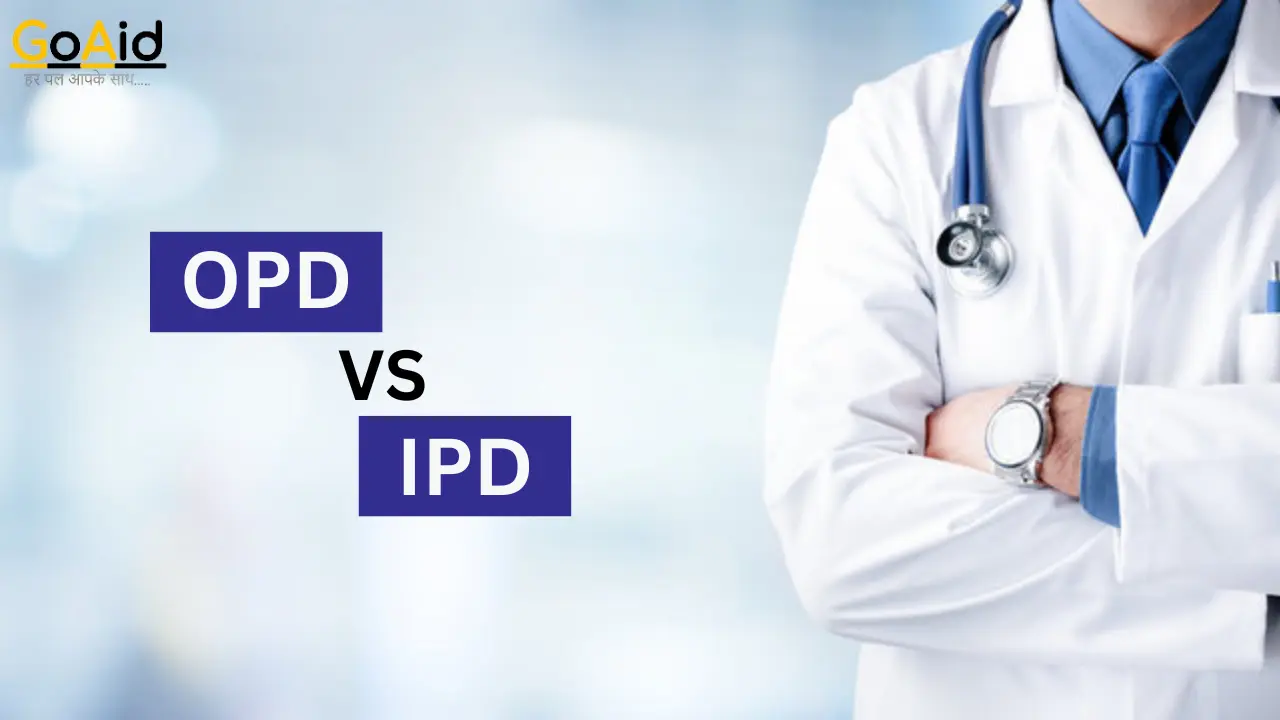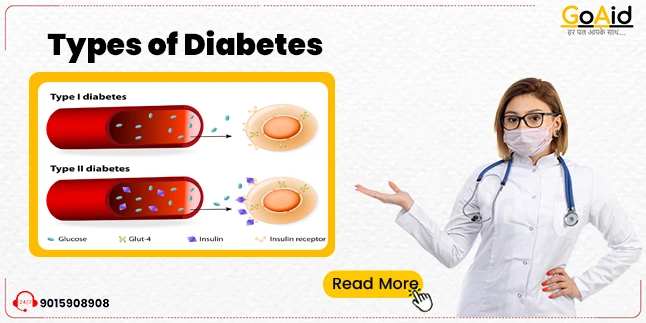If you are aware of hospitals and medical facilities that are provided in the hospitals, then you must have heard about OPD and IPD. The general thinking is both of these are used for Emergency medical services but this is only some of it. Knowing about the Difference Between OPD and IPD is crucial for all citizens because it will help you in your medical emergency.
If you are also looking to know about the Difference Between the OPD and IPD, then in this blog, we have provided you with all the details about the difference Between the OPD and IPD such as their basic definitions, services provided under each of them, their full form, their common procedure, their admission process and much more. Read this blog to the end to know all the details about OPD and IPD.
So, letŌĆÖs start-
Complete details about the Difference Between OPD and IPD
We have provided you with all the details about the Difference Between the OPD and IPD. We have explained every component of both OPD and IPD below:
Difference between the Full Form / Definition of OPD and IPD
When we talk about the Difference between OPD and IPD, the main difference is between their definitions. So, letŌĆÖs start firstly with the difference between the full form of OPD and IPD. The primary difference between OPD and IPD is hidden behind their full forms and definitions. The full form of OPD is the Outpatient Department.
It refers to a healthcare service area where patients receive medical consultation, diagnosis, and treatment without needing to be admitted to the hospital. Patients visit the OPD for routine check-ups, follow-up consultations, minor procedures, or specific medical advice and then return home the same day.
On the other hand, the full form of IPD is the Inpatient Department and IPD involves a more extensive level of care. Generally, patients are admitted to the hospital’s IPD when they require ongoing monitoring, surgery, or intensive treatment that cannot be completed in a single day. In IPD, patients stay in the hospital for a period ranging from overnight to several days or weeks.
The time of staying patients in IPD depends on the complexity of their condition. The IPD provides comprehensive care, including nursing support, advanced diagnostics, and specialized treatments, ensuring patients receive the necessary medical attention around the clock.
Read More: Free Ambulance Service in Mumbai
Difference between the Common Procedure / Services of OPD and IPD
Now for the next factor, when we discuss the Difference between OPD and IPD, another main factor is their common procedure or the services that a patient gets under OPD and IPD. We have added comprehensive points about the common procedures and the services provided under both these OPD and IPD in the table below:
| Aspect | OPD (Outpatient Department) | IPD (Inpatient Department) |
| Duration of Stay | Patients visit for a few hours, no overnight stay is required. | Patients stay overnight or longer, depending on their condition. |
| Type of Care | Primary and preventive care, minor treatments. | Intensive care, post-operative care, and monitoring. |
| Common Procedures | Routine check-ups, and diagnostic tests (X-rays, blood tests). | Surgeries are complex procedures requiring anesthesia. |
| Patient Monitoring | Minimal monitoring, usually during the visit only. | Continuous monitoring with vital signs tracked regularly. |
| Consultation Services | General consultation with doctors or specialists. | Specialist consultations with ongoing medical supervision. |
| Medical Interventions | Minor interventions like wound dressing, and vaccinations. | Major interventions, including surgeries and therapy sessions. |
| Follow-Up Care | Post-treatment follow-ups, and medication adjustments. | Intensive follow-up with rehabilitation, and physical therapy. |
| Equipment Used | Basic medical equipment like BP monitors, and stethoscopes. | Advanced equipment like ventilators, and heart monitors. |
| Admission Process | No admission process; patients walk in for services. | Requires formal admission with detailed patient records. |
| Insurance Coverage | Often limited or not required, depends on the service. | Typically involves extensive insurance coverage due to higher costs. |
Difference between the Admission process of OPD and IPD
Now, another main factor for the Difference between OPD and IPD is their admission process. If a person needs the help of any of the OPD or IPD, then they may need to register with them. But the procedure for registering for them is a bit different. The admission process for OPD (Outpatient Department) and IPD (Inpatient Department) varies significantly because it reflects the different levels of care provided in each.
Also Read: Steps India Is Taking to Ensure the Safety of Women | Explained
OPD (Outpatient Department) Admission Process:
- Visit or Appointment: Patients either walk in or arrive at a scheduled appointment time.
- Registration: Basic personal details are collected at the reception desk.
- Token/Queue Number: A token or queue number is provided for managing patient flow.
- Consultation Fee: Payment of the consultation fee, if applicable.
- Consultation: Patients meet with a doctor or specialist for evaluation and treatment.
- Diagnostic Tests: If needed, the doctor may order tests like X-rays or blood work, which are usually performed on the same day.
- Treatment/Prescription: Minor treatments are administered, and prescriptions are provided.
- Follow-Up Instructions: Patients receive instructions for follow-up visits or care at home.
- Billing and Payment: Final billing is processed if any additional services or tests are provided.
- Exit: Patients leave the hospital or clinic the same day without any further formalities.
Know More: Free Ambulance Service for Pregnant Women in India
IPD (Inpatient Department) Admission Process:
- Doctor’s Recommendation: Admission is typically initiated after a doctorŌĆÖs recommendation, often following an OPD visit or emergency evaluation.
- Pre-Admission Approval: Necessary pre-approvals from insurance companies or other relevant parties are obtained if required.
- Formal Registration: Detailed personal and medical history is recorded at the admission desk.
- Consent Forms: Patients or their guardians sign consent forms for treatment, surgeries, or procedures.
- Room/Bed Assignment: A specific room or bed in the hospital is allocated based on the patientŌĆÖs needs and availability.
- Initial Assessment: Nurses or attending doctors conduct an initial assessment, including vital signs and basic diagnostics.
- Documentation: All relevant documents, including identification and insurance details, are submitted and verified.
- Advance Payment: An initial deposit or advance payment may be required depending on the hospital’s policies.
- Admission to Ward/ICU: Patients are transferred to their designated ward, room, or ICU for further treatment.
- Continuous Care: A treatment plan is initiated with ongoing monitoring, medication, and care provided by the medical team.
Read More: The Ambulances in India ŌĆō Types and Uses
Difference Between the General Hospital timings of OPD and IPD
The Difference between OPD and IPD can also be differentiated by the general hospital timing for both OPD and IPD. These are the key differences between the general hospital timing for OPD and IPD:
| Aspect | OPD (Outpatient Department) | IPD (Inpatient Department) |
| Operating Hours | Typically open during regular business hours, often 8 AM to 5 PM. | Operates 24/7, with no closure at any time. |
| Appointment Slots | Appointments are usually scheduled within specific time slots. | No appointments are needed; care is continuous and round-the-clock. |
| Specialist Availability | Specialists are available during specific hours or days. | Specialists and doctors are on-call or available at all times. |
| Emergency Services | Limited emergency services, generally directed to the ER if outside OPD hours. | Full emergency services are available at any time, including nights and weekends. |
| Patient Interaction | Interaction is limited to the scheduled appointment time. | Continuous interaction and care, including night rounds and regular check-ins. |
Also Read: Importance of Health, Benefits, Types, Maintain & Factors
Difference Between the General Types of Wards in Hospitals for OPD and IPD
Now another key factor that tells us the Difference between OPD and IPD, is the type of wards for OPD and IPD. However, there is either no need or very little need for the wards for OPD, but for IPD. You can get this from the table below:
| Aspect | OPD (Outpatient Department) | IPD (Inpatient Department) |
| Ward Availability | No dedicated wards; patients visit consultation rooms or specialized OPD clinics. | Dedicated wards with various categories, including general, semi-private, and private rooms. |
| Patient Stay | Patients do not stay overnight, so no wards are required. | Patients are admitted and stay in assigned wards for continuous care. |
| Specialized Areas | Specific areas for diagnostic tests, minor procedures, and consultations. | Specialized wards for different types of care, such as ICU, maternity, pediatric, and surgical wards. |
| Privacy Levels | Limited privacy, usually in shared consultation areas. | Varies from shared wards to private rooms, offering different levels of privacy and comfort. |
| Facility Access | Access to basic facilities like waiting rooms and restrooms. | Access to comprehensive facilities, including bathrooms, nursing stations, and sometimes family lounges. |
Also Read: Difference between BLS Ambulance and ALS Ambulance
Difference Between the Benefits / Importance of OPD and IPD
Now, after all of that, the major difference between OPD and IPD is their benefits and importance. Both of these OPD and IPD are different & this is why, their benefits / Importance are also different:
| Aspect | OPD (Outpatient Department) | IPD (Inpatient Department) |
| Cost-Effective | Generally lower cost as no overnight stay is required. | Comprehensive care despite higher costs due to extended stays. |
| Convenience | Patients can visit during scheduled times and return home the same day. | Provides continuous care without the need for daily travel to the hospital. |
| Time-Saving | Appointments are often short, making it easy to fit into a busy schedule. | No need to worry about scheduling multiple appointments; all care is provided during the stay. |
| Less Stressful | No need for admission, reducing the anxiety associated with hospital stays. | Dedicated care and support reduce stress, especially in serious conditions. |
| Access to Specialists | Easy access to specialists for specific concerns. | Continuous access to a team of specialists for comprehensive care. |
| Minimal Disruption to Daily Life | Patients can maintain their normal routines with minimal disruption. | Intensive care allows patients to focus entirely on recovery without outside distractions. |
| Focused Care | Care is focused on specific health issues or routine check-ups. | Holistic care addresses multiple aspects of a patientŌĆÖs health simultaneously. |
| Lower Risk of Infection | Less exposure to hospital environments, reducing the risk of hospital-acquired infections. | Higher safety measures are in place to manage and treat infections if they occur. |
| Flexibility in Scheduling | Patients can choose convenient times for appointments. | Care is continuous, with no need to worry about scheduling or availability. |
| Follow-Up Ease | Easy to schedule follow-ups or additional consultations as needed. | Comprehensive follow-up care is provided during and after the stay, ensuring continuity of care. |
Read More: Standard Protocols for Paramedics to Follow
Conclusion to the Difference Between OPD and IPD
In conclusion, we have provided you with all the factors that can help you differentiate between the Out Patient Department (OPD) and In-Patient Department (IPD). By understanding the unique features, benefits, and processes of each, you can make more informed decisions about your healthcare needs.
OPD is ideal for those seeking routine check-ups, minor treatments, or consultations without the need for an overnight stay, offering convenience and cost-effectiveness. On the other hand, IPD is essential for patients requiring intensive care, surgery, or prolonged treatment, ensuring continuous medical supervision in a hospital setting.
Knowing the difference between OPD and IPD helps you choose the right type of care based on the severity of your condition and the level of treatment required. If you have any other questions about the Difference between OPD and IPD, please feel free to ask in the comment box.
FAQ
Question-1: What is the difference between OPD and IPD?
Answer: The primary difference between OPD (Out Patient Department) and IPD (In Patient Department) lies in the nature of treatment. OPD deals with patients who visit the hospital for consultations, diagnosis, or minor treatments without the need for hospitalization, while IPD involves patients who require admission for more serious conditions, surgeries, or extended care.
Question-2: What services are provided in OPD?
Answer: OPD (Out Patient Department) provides services like consultations, diagnostic tests, minor surgeries, vaccinations, and follow-up care. Patients visit the hospital for diagnosis and treatment of conditions that do not require overnight stays or extended hospitalization, ensuring outpatient care in a timely manner.
Question-3: What type of treatment is available in IPD?
Answer: In IPD (In Patient Department), patients receive more intensive care that requires hospitalization, such as surgeries, complex treatments, or monitoring. These services include specialized care, overnight stays, post-operative recovery, and ongoing treatments that cannot be done on an outpatient basis.
Question-4: How long does a patient stay in OPD?
Answer: Patients typically do not stay in OPD (Out Patient Department) for long periods. The visits are usually brief, for consultations, minor treatments, or diagnostic tests. Patients return home the same day after receiving care or prescriptions for further treatment.
Question-5: What is the role of IPD in hospitals?
Answer: IPD (In Patient Department) plays a crucial role in providing extended care for patients who need round-the-clock monitoring, treatment, or surgical intervention. This department ensures comprehensive care for patients who require longer hospital stays, offering specialized treatment and professional care throughout their recovery.
Question-6: Who decides whether a patient should be in OPD or IPD?
Answer: The decision of whether a patient requires OPD (Out Patient Department) or IPD (In Patient Department) is made by the doctor based on the patientŌĆÖs condition. Minor issues or consultations are treated in OPD, while serious conditions, surgeries, or medical conditions that need constant monitoring lead to admission in IPD.
Question-7: Can an OPD patient be admitted to IPD?
Answer: Yes, an OPD patient can be admitted to IPD if the doctor deems the patientŌĆÖs condition serious enough to require further treatment or hospitalization. For example, a patient initially visiting OPD for consultation may require hospitalization for surgery or more complex care.
Question-8: How do the medical costs compare between OPD and IPD?
Answer: The medical costs for OPD (Out Patient Department) are typically lower than for IPD (In Patient Department) since OPD involves only consultation, diagnostic tests, or minor treatments. IPD, on the other hand, includes costs for hospitalization, round-the-clock care, surgeries, and extended treatment, making it more expensive.
Question-9: What are the facilities available in IPD that are not available in OPD?
Answer: IPD (In Patient Department) offers facilities such as overnight stays, specialized nursing care, intensive monitoring, surgical procedures, and access to specialized equipment. In contrast, OPD provides diagnostic services, consultations, and minor treatments without requiring the patient to be admitted to the hospital.
Question-10: How does the admission process differ between OPD and IPD?
Answer: In OPD (Out Patient Department), the process involves a simple consultation, where patients walk in, see a doctor, and leave the same day after receiving treatment or a prescription. However, in IPD (In Patient Department), the process includes formal admission procedures, where patients are checked in, assigned a room, and monitored for more complex treatments or surgeries.
















